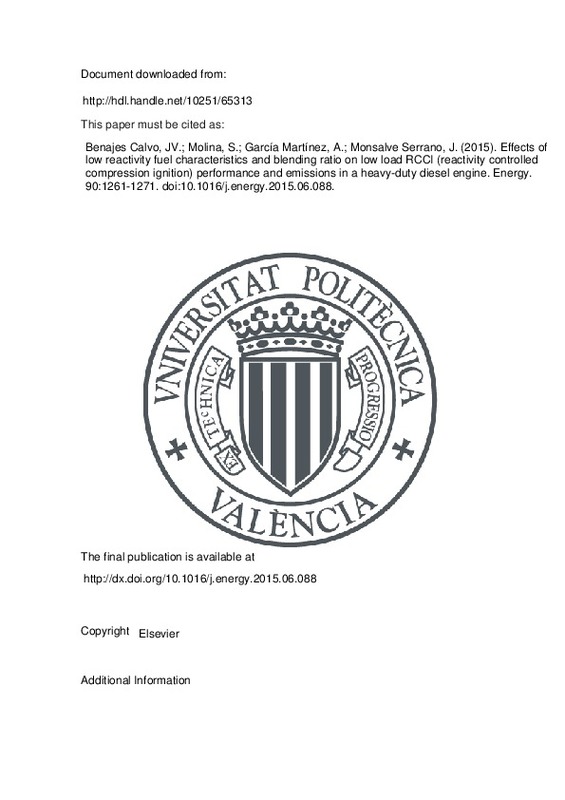JavaScript is disabled for your browser. Some features of this site may not work without it.
Buscar en RiuNet
Listar
Mi cuenta
Estadísticas
Ayuda RiuNet
Admin. UPV
Effects of low reactivity fuel characteristics and blending ratio on low load RCCI (reactivity controlled compression ignition) performance and emissions in a heavy-duty diesel engine
Mostrar el registro sencillo del ítem
Ficheros en el ítem
| dc.contributor.author | Benajes Calvo, Jesus Vicente
|
es_ES |
| dc.contributor.author | Molina, Santiago
|
es_ES |
| dc.contributor.author | García Martínez, Antonio
|
es_ES |
| dc.contributor.author | Monsalve Serrano, Javier
|
es_ES |
| dc.date.accessioned | 2016-06-06T12:16:54Z | |
| dc.date.available | 2016-06-06T12:16:54Z | |
| dc.date.issued | 2015-10 | |
| dc.identifier.issn | 0360-5442 | |
| dc.identifier.uri | http://hdl.handle.net/10251/65313 | |
| dc.description.abstract | This work investigates the effect of low reactivity fuel characteristics and blending ratio on low load RCCI (reactivity controlled compression ignition) performance and emissions using four different low reactivity fuels: E10-95, E10-98, E20-95 and E85 (port fuel injected) while keeping constant the same high reactivity fuel: diesel B7 (direct injected). The experiments were conducted using a heavy-duty single-cylinder research diesel engine adapted for dual fuel operation. All tests were carried out at 1200 rev/min and constant CA50 of 5 CAD ATDC. For this purpose, the premixed energy was equal for the different blends and the EGR (exhaust gas recirculation) rate was modified as required, keeping constant the rest of engine settings. In addition, a detailed analysis of air/fuel mixing process has been developed by means of a 1-D spray model. Results suggest that in-cylinder fuel reactivity gradients strongly affect the engine efficiency at low load. Specifically, a reduced reactivity gradient allows an improvement of 4.5% in terms of gross indicated efficiency when the proper blending ratio is used. In addition, EURO VI NOx and soot emission levels are fulfilled with a strong reduction in CO and HC compared with the case of the higher reactivity gradient among the low and high reactivity fuel. | es_ES |
| dc.description.sponsorship | The authors acknowledge VOLVO Group Trucks Technology and TOTAL for supporting this research. | en_EN |
| dc.language | Inglés | es_ES |
| dc.publisher | Elsevier | es_ES |
| dc.relation.ispartof | Energy | es_ES |
| dc.rights | Reserva de todos los derechos | es_ES |
| dc.subject | Reactivity controlled compression ignition | es_ES |
| dc.subject | Low load | es_ES |
| dc.subject | Low reactivity fuels | es_ES |
| dc.subject | Mixing process | es_ES |
| dc.subject | Efficiency | es_ES |
| dc.subject.classification | MAQUINAS Y MOTORES TERMICOS | es_ES |
| dc.title | Effects of low reactivity fuel characteristics and blending ratio on low load RCCI (reactivity controlled compression ignition) performance and emissions in a heavy-duty diesel engine | es_ES |
| dc.type | Artículo | es_ES |
| dc.identifier.doi | 10.1016/j.energy.2015.06.088 | |
| dc.rights.accessRights | Abierto | es_ES |
| dc.contributor.affiliation | Universitat Politècnica de València. Instituto Universitario CMT-Motores Térmicos - Institut Universitari CMT-Motors Tèrmics | es_ES |
| dc.contributor.affiliation | Universitat Politècnica de València. Departamento de Máquinas y Motores Térmicos - Departament de Màquines i Motors Tèrmics | es_ES |
| dc.description.bibliographicCitation | Benajes Calvo, JV.; Molina, S.; García Martínez, A.; Monsalve Serrano, J. (2015). Effects of low reactivity fuel characteristics and blending ratio on low load RCCI (reactivity controlled compression ignition) performance and emissions in a heavy-duty diesel engine. Energy. 90:1261-1271. doi:10.1016/j.energy.2015.06.088 | es_ES |
| dc.description.accrualMethod | S | es_ES |
| dc.relation.publisherversion | http://dx.doi.org/10.1016/j.energy.2015.06.088 | es_ES |
| dc.description.upvformatpinicio | 1261 | es_ES |
| dc.description.upvformatpfin | 1271 | es_ES |
| dc.type.version | info:eu-repo/semantics/publishedVersion | es_ES |
| dc.description.volume | 90 | es_ES |
| dc.relation.senia | 295253 | es_ES |
| dc.identifier.eissn | 1873-6785 | |
| dc.contributor.funder | Volvo Group Trucks Technology | es_ES |







![[Cerrado]](/themes/UPV/images/candado.png)

